
views
Sending an Email

Find out if the company is accepting referrals. Some companies do not accept referrals, as they believe in an unbiased hiring system, so check with your boss or HR to find out if yours does. Also, a position must be open in your company for you to refer someone for a position. You need to ask around and check any job listings to see if a position is open that your friend would fit. For example, you could ask friends in different departments if they've heard of any openings. Think about the openings that would be the best fit for your friend's skill set. If you're on friendly terms, you can also ask your boss if any openings are likely to come available soon. Make sure to let them know you're asking about jobs so you can refer a friend.

Figure out the appropriate person to send the email to. If they're hiring in your department, then you'll need to send it to your boss. However, if it's another department, you may need to figure out who's on the hiring committee or send it to human resources. Sending an email is better than casually recommending a friend in person. It gives you a chance to play up their good qualities, plus the hiring committee has something to refer back to later.
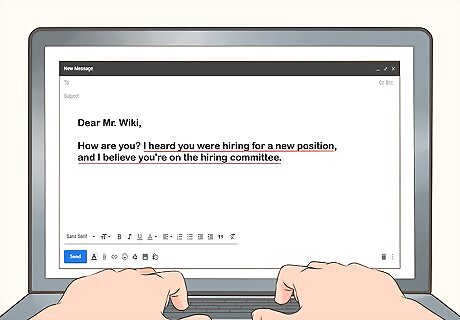
Address the purpose early on. While you may want to start with some niceties, such as "How are you?" make sure you get to the point quickly. Bring up the position to get the conversation going, for instance. You could say, "I heard you were hiring for a new position, and I believe you're on the hiring committee."
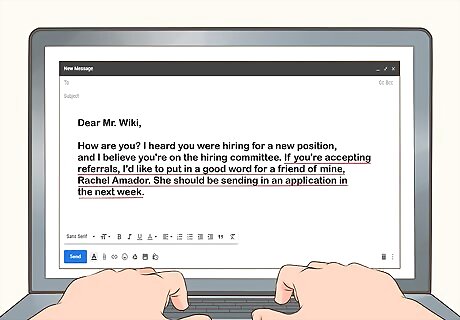
Bring up the referral. Next, you need to talk about why you're mentioning the position. They may think you are wanting to recommend yourself, so you need to be clear about what you want, making a recommendation for a friend. You could write, "If you're accepting referrals, I'd like to put in a good word for a friend of mine, Rachel Amador. She should be sending in an application in the next week."

Offer information on the person. You also want to say why you think your friend will be a good fit for the position, not just bring up that they want the job. That way, you can help the person doing the hiring understand how your friend is a good fit. For instance, you could write, "Rachel is a hard worker, which I know because I worked with her at a previous job for 5 years. She always shows up on time and gets work down ahead of deadlines. She also has the initiative to see what needs to be done and do it."

Close the email. One thing you should do as you close the email is note that you welcome any questions that the hiring committee has about the person. You want to be available to allay any concerns they have about hiring your friend. For example, you could write, "I feel Rachel is a strong candidate for this position, so if you have any questions, feel free to approach me with them."
Using the Company's Referral System

Find out if your company has a referral system. Some large companies have systems in place to make it easy for you to refer people for jobs. In addition, many of these companies also offer bonuses if you refer someone they hire, so it's good to go through the proper channels if you can.
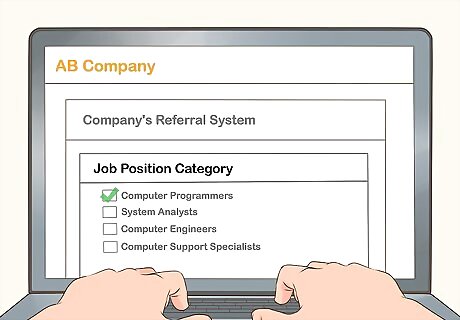
Choose the position. Usually, you refer friends for a specific position, so make sure you know exactly what position your friend wants to apply for. Sometimes, the referral system is integrated into the job listings, so you simply find the correct job. Other times, you may need to enter the position into a form.
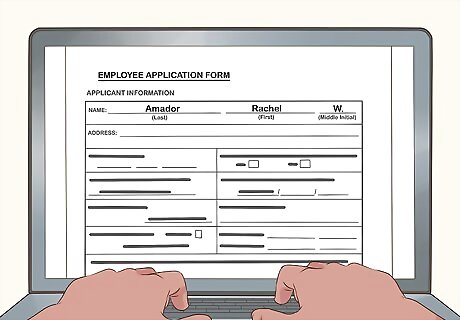
Fill out the form. Once you choose the right position, you'll need to fill in some information about your friend, such as the person's name, address, phone number, and email address. You'll also need to fill in this information for yourself, as well.
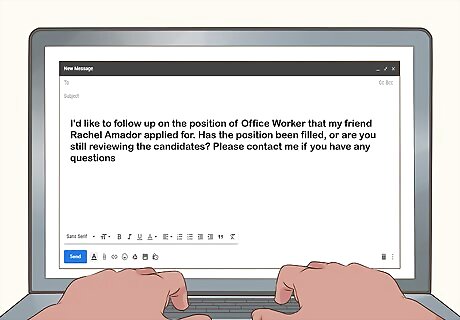
Follow up later. If you haven't heard anything in return for about a month, it's fine to follow up and see what's going on. You can send another email to see if the job is still open or if someone has been hired to the position without your knowledge. For instance, you could write, "I'd like to follow up on the position of Office Worker that my friend Rachel Amador applied for. Has the position been filled, or are you still reviewing the candidates? Please contact me if you have any questions."
Deciding If the Person Is a Good Fit

Ask the person if they're serious about the job. You don't want to recommend someone to a job who isn't serious about taking it. It wastes the company's time and reflects badly on you. Therefore, it's always good to make sure the person really wants the job before referring them.
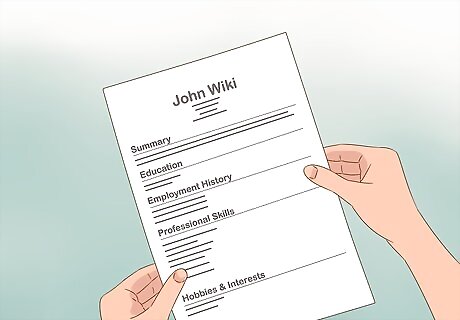
Pore over their work history. When considering whether the person would actually be a good fit at your company, think about the person's work history, such as their skills and commitment. For instance, does your friend really have the skills needed to complete the job? If not, you shouldn't recommend them. Similarly, if they don't have the experience that one would expect for the job, then you probably shouldn't recommend them. To help with the research, ask your friend for some evidence that they have the skills to do the job. For example, you can ask to see a resume to make sure they've actually done enough to perform well.

Make sure you can actually vouch for the friend. That is, if you don't know the person very well (if they're more of an acquaintance than a friend), then can you really say how well they would do in the position? Make sure you can say with confidence that the person has the skills for the job. You don't want to risk your own position for someone you don't know all that well.
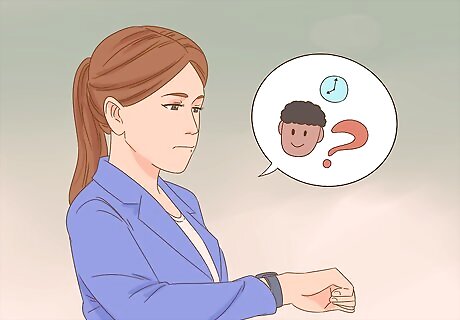
Base part of your judgment on your interactions. Think about the way your friend acts when they're around you. For example, if they're always late, that could be a bad sign, as they always be late for work, too. Alternatively, maybe you've noticed that they always seem to not have enough money, which could mean they don't manage their money well; that can be a bad sign for how well they manage all aspects of their life, including work.

Judge whether you could work with the person. Being friends with someone and working with them are two totally different things. A small, annoying habit as a friend can turn into a much larger annoyance with a coworker. Think about whether you could spend significantly more time around the person before deciding whether to recommend them.

Bow out if it doesn't feel right. If you can't in good conscience say the person is a good fit for the job, you should not offer to put in a good word. You could tell your friend you don't feel like you're in a good position to refer them for the position or simply say you don't think they're a good fit.















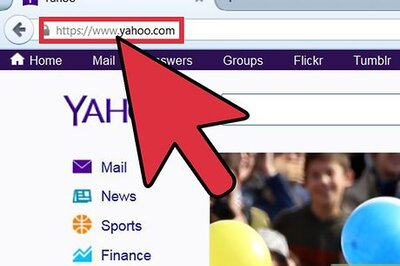




Comments
0 comment